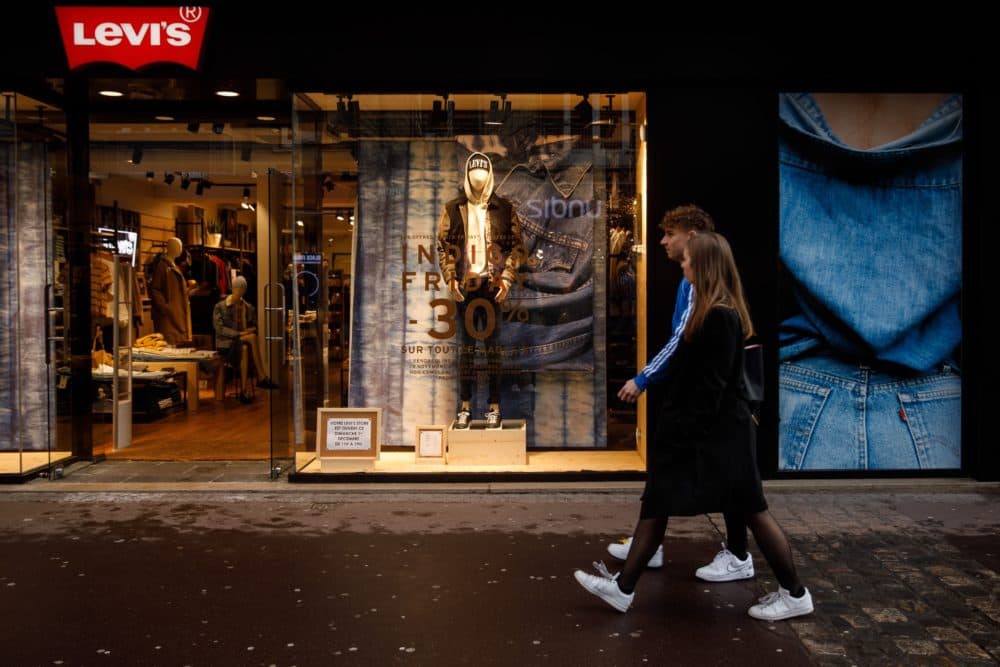Advertisement
Levi Strauss CEO Chip Bergh On The Changing Landscape Of Retail
Resume
It comes as no surprise that April was a brutal month for retail, with losses of more than 20 million jobs as private sector companies shut down temporarily, or permanently, during the global coronavirus pandemic.
Industry analysts say with no clear end to the spread of the virus and economies opening up slowly, they expect this crisis to permanently change the landscape of retail.
Among the retailers affected is the 167-year-old Levi Strauss & Co., which according to CEO Chip Bergh has "been through everything," including the 1918 flu pandemic.
And while he predicts his company will recover, he says that will require accelerating its efforts to directly sell its own product and continuing to shift focus away from U.S. wholesale companies, including Kohl's, Macy's and Sears, which he says are going to suffer in the crisis.
"Our strategy has been to shift our focus to our own retail business, both brick and mortar and e-commerce and to shift our focus to international," which already has been in the making, Bergh says.
Eight years ago, 60% of Levi's business was in the U.S. and almost 50% was in U.S. wholesale, he says. Today, there's less than 40% in the U.S. and less than 30% of that market is in wholesale, which means the company is in control of its own brand.
Still, the data firm Amperity has some pretty bleak figures. They say demand for food and health-related items is strong but demand for apparel has fallen 57%.
Bergh says there's no question that Levi’s is going to take "a hit." In April, he says, 75% of Levi's stores were closed globally, as well as most of its wholesale customers.
But he says the brand continues to resonate with young consumers. And with some economies reopening, Levi's is finding out what the future of their stores might be.
"We've had some stores in Europe that have done really well on the first day that they opened," he says.
Bergh attributes that, at least in part, to the company's effort to stay connected to its customers. This has included "bringing Coachella" into consumer's homes by live streaming an artist at 5:01 p.m. daily — a nod to the company's flagship 501 Jeans — on Levi's Instagram page. This comes after the music festival was postponed until October due to the pandemic.
In the meantime, Levi Strauss has furloughed more than 4,000 hourly employees, and Bergh himself has taken a 50% pay cut. And while growing the brand is among his major concerns, he says there's also a focus these days on safety.
The company continued to pay its employees for the first month after stores shut down, he says. When the government's CARES Act went into effect, the employees were furloughed with the promise of getting their jobs back.
In terms of physical safety, Bergh says employees will have personal protective equipment and hand sanitization, as well as special procedures for clothing that has been tried on.
"If a consumer doesn't buy that product we will quarantine it for 24 hours," he says.
In addition, there will be visible cleaning in the stores at all times, and they'll be limiting the number of customers in the store. As a corollary to that, there will be buy online/pick up in store and buy online/pick up on curbside services; and if there's a line outside, customers will be encouraged to order online and have their purchases brought out to them.
Bergh says there's also attention being paid to the supply chain since 99% of the company's product is made outside the U.S. in countries such as Japan, China, Bangladesh and Italy. And many of those factories are shuttered.
"The economic impact, as tough as it's been in the U.S., you can imagine how hard it is in places like Bangladesh and other parts of Asia," he says.
To that end, the company has created a $3 million fund, with $1 million of which going to support communities in areas where Levi Strauss has a "large supply chain presence."
Another $1 million, he says, is going to the company's employee-driven nonprofit organization that was started 40 years ago.
"We wanted that foundation to be well funded to support our employees and retirees,” he says.
Karyn Miller-Medzon produced and edited this interview for broadcast with Kathleen McKenna. Miller-Medzon also adapted it for the web.
This segment aired on May 7, 2020.

